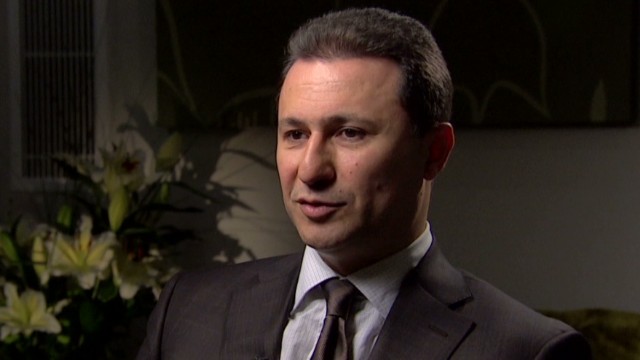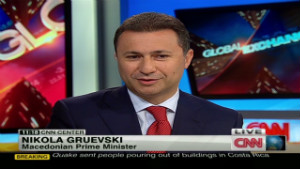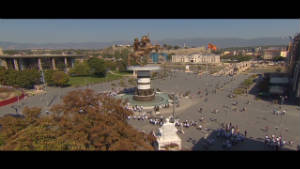Macedonian leader: Greece is avoiding talks over name dispute
January 14, 2014 -- Updated 1651 GMT (0051 HKT)

Macedonia's EU ambitions
STORY HIGHLIGHTS
- The dispute over Macedonia's state name with Greece began when the country gained independence in 1991
- In 2011 the International Court of Justice ruled that Greece was wrong to block Macedonia's bid to NATO in 2008
- Macedonia already "sufficiently" meets the political criteria to open negotiations, according to European Commission
In an interview with CNN,
Macedonian Prime Minister Nikola Gruevski said that Greece is "very
successful" in making the Balkan nation look "guilty" over the use of
the word "Macedonia" in its state name.
"Greece is not ready to make a compromise ... so we cannot solve the issue," he said.
Gruevski said the Greek
government is "rejecting" Macedonia's advances to open talks and
revealed that he tried to contact Greek Prime Minister Antonis Samaras,
but his offers were rejected.
Gruevski added: "The
international law is on our side and I believe that if Greece decides to
respect international law, we can start the negotiations with the EU
and we can join NATO immediately."
 Macedonia's economic way forward
Macedonia's economic way forward
 Macedonia's pride or folly?
Macedonia's pride or folly?
 Macedonian firm creates Hollywood magic
Macedonian firm creates Hollywood magic
The name dispute between the two countries has rumbled on since Macedonia gained independence from Yugoslavia in 1991 leading to a U.N. accord signed by both parties four years later.
The disagreement centers
around the use of the name Macedonia as well as symbols and figures used
by the FYROM: these are traditionally considered part of Greek culture
from the period when the region was part of ancient Greece.
The most prominent of
these figures is Alexander the Great, Greek king of Macedon, who went on
to forge one of the largest empires of the ancient world. In 2011, the
Macedonian government unveiled a 39 ft statue of the legendary leader in
the central square of the nation's capital, Skopje.
The International Court
of Justice in The Hague ruled in 2011 that Greece was wrong to block
Macedonia's bid to join NATO in 2008.
The
ICJ said: "Greece, by objecting to the admission of the former Yugoslav
Republic of Macedonia [FYROM] to NATO, has breached its obligation" to a 1995 Interim Accord not to block Macedonian applications made under its current name.
In response to
Gruevski's claims, Konstantinos Koutras, spokesman for the Greek
Ministry of Foreign Affairs, told CNN that a number of Samaras'
predecessors had met with the Macedonian Prime Minister, but that they
were simply "photo opportunities and a façade."
Koutras said: "A whole
generation in FYROM is being poisoned with bitter feelings against
Greece, which is branded as the culprit for all evils their country is
being faced with."
He added: "If Skopje had shown equal degree of commitment, the name issue would have been settled."
When asked whether the
government would consider removing "Macedonia" from its name, Gruevski
said: "There are many parts of this problem... if there is a dialogue, I
believe we can find a solution."
But Kurt Volker, former
U.S. permanent representative to NATO, told CNN that while modifying the
name is possible, taking "Macedonia" out of the name completely is not
under discussion.
Volker said: "I think
that the Macedonians have moved quite far and I think that they are
prepared to make an agreement on a modified name for the country for the
purposes of being recognized in international organizations."
However, he added: "That
doesn't go as far as the Greeks have insisted. They wanted to change
everything including for the Macedonians to change their constitution.
That's just pie in the sky, that's never going to happen."
Macedonia submitted its application to join the EU in 2004 but is yet to open negotiations with legislators over EU status.
EU membership would give
Macedonia -- a country of just 2.1 million people according to Eurostat
-- access to the world's largest trading bloc and representation at the
European institutions in Brussels.
Macedonia already has
free trade agreements with a number of non-EU countries including
Switzerland, Norway, Turkey and Ukraine in addition to states within
Europe's economic and political union.
The international law is on our side and I believe that if Greece
decides to respect international law, we can start the negotiations with
the EU.
Macedonia Prime Minister Nikola Gruevski
Macedonia Prime Minister Nikola Gruevski
According to an
assessment by the European Commission, Macedonia "sufficiently" meets
the political criteria to open negotiations.
Peter Stano, spokesman
for European Enlargement Commissioner Stefan Fule, told CNN that the
Brussels-based legislature has recommended for five years in a row to
open accession negotiations with Macedonia.
He added: "Together we
are stronger, and especially in the Western Balkans, we contribute to
the reconciliation among nations and to guaranteeing peace and
reinforcing stability in a region marked by conflicts in a not so
distant past."
Gruevski said that
membership for all countries in the Balkans will provide "long term
stability" to the region and ultimately attract more foreign investment.
"Personal income tax is
10%, profit tax is 10%. The other taxes are also very low, so as a
package we are offering the best tax package to the companies that are
coming."
With low inflation and
growth forecast at 2.8% this year, Macedonia could represent a
significant opportunity for investors looking to tap southeast Europe.
Asked whether Macedonia
would have to raise taxes if they gained entry into the EU, Gruevski
said: "We will try not to go up but when the time comes we will see."
No comments:
Post a Comment